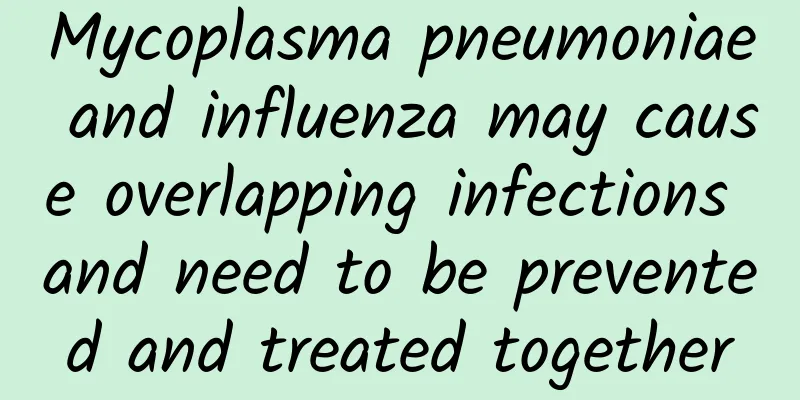Mycoplasma pneumoniae and influenza may cause overlapping infections and need to be prevented and treated together

|
Mycoplasma pneumoniae and influenza may cause overlapping infections and need to be prevented and treated together Healthy Duchang 2023-11-28 15:43 Published in Jiangxi Click on the blue words above to follow us With the change of seasons, children's respiratory diseases have also entered a high incidence period. Recently, many hospitals across the country have received many children infected with Mycoplasma pneumoniae, most of whom have symptoms such as fever and dry cough. At a press conference on the prevention and control of winter respiratory diseases held by the National Health Commission in early November, it was introduced that as various places gradually enter winter, respiratory diseases have entered the high incidence season, and multiple respiratory diseases are intertwined and superimposed. It is required that all places should adhere to the prevention and treatment of multiple diseases at the same time, and pay close attention to the prevalence of Mycoplasma pneumoniae, new crown infection, influenza, etc. Can Mycoplasma pneumoniae and influenza be superimposed? 1 It is possible. Mycoplasma pneumonia and influenza are caused by infection with Mycoplasma pneumoniae and influenza virus respectively. The pathogens of the two diseases are different. Most of the symptoms after infection are similar, but there are still differences. The respiratory symptoms of mycoplasma pneumonia are more obvious and last longer, while influenza has obvious systemic symptoms such as fatigue, headache, and muscle pain. Autumn and winter are also the peak seasons for influenza, and there is a possibility of mixed infection of mycoplasma and influenza. It is recommended that children of appropriate age should actively receive influenza vaccination if there are no contraindications. How long does it take for a child to go to school after being infected with Mycoplasma pneumoniae? 2 The course of treatment for Mycoplasma pneumonia depends on the condition of the disease. The course of the disease is generally 2 to 4 weeks, and the optimal treatment window is 5 to 10 days after fever. It is generally believed that children can return to school after their clinical symptoms have basically disappeared and their physical strength has basically recovered. When children are sick, especially when they have a fever or severe cough, they need plenty of rest. At the same time, their immunity is weak and they are easily attacked by other pathogens and cause co-infection. It is worth noting that mycoplasma pneumonia is highly contagious, and the relatively dense flow of people on campus can easily lead to cross-infection. How long after recovering from mycoplasma infection can I get the flu vaccine? 3 Disease does not affect the effectiveness of the vaccine or the occurrence of adverse reactions, but in order to reduce coincidental diseases, we recommend that vaccination should be postponed during the acute stage of the disease or the acute attack of a chronic disease. After the mycoplasma infection is completely cured, as long as there are no other contraindications to vaccination, the flu vaccine can be given. If you have symptoms such as fever and cough, you can wait until the symptoms recover before getting the flu vaccine. Do I need to get the flu vaccine again this year if I have received it before? 4 Still need to get vaccinated! It is recommended to get the flu vaccine every year! Because the new vaccine will update the vaccine components according to the flu strains that may be prevalent, the protection effect is better; the protection of the flu vaccine will decrease over time, and the antibody level will drop significantly one year after vaccination; continuous flu vaccination has a better protection effect than intermittent vaccination. Do I still need to get the pneumonia vaccine if I have had Mycoplasma pneumonia? 5 Yes! At present, there is no vaccine to prevent mycoplasma pneumonia, and its prevention mainly relies on non-drug intervention measures. However, pneumonia caused by pneumococcus can be prevented by vaccines. Pneumococcal vaccines include 13-valent pneumococcal vaccine and 23-valent pneumococcal vaccine. The 13-valent pneumococcal vaccine can prevent infections caused by 13 serotypes of pneumococci. It is suitable for children aged 6 weeks to 5 years old, and 1 to 4 doses are administered according to different ages. The 23-valent pneumococcal vaccine can prevent pneumonia caused by 23 serotypes of pneumococcal infection. It is suitable for people over 2 years old, especially key groups such as the elderly, those with low immune function, and those with chronic diseases. Generally, only one vaccination is required. Regarding the prevention of pneumonia, it is recommended that everyone jointly vaccinate with influenza vaccine, because influenza can easily induce pneumonia. The simultaneous vaccination of the two vaccines will neither increase the incidence of adverse reactions nor affect the effectiveness of each vaccine, but also play a role of double protection. How to choose the flu vaccine? 6 The influenza vaccines available on the market worldwide include inactivated vaccines (including split vaccines and subunit vaccines), live attenuated vaccines, and recombinant vaccines. According to the components contained in the vaccine, it can be divided into trivalent and quadrivalent influenza vaccines. Compared with the trivalent influenza vaccine, the quadrivalent influenza vaccine strain has added a spectrum of influenza B. Inactivated vaccines are injected intramuscularly, and live attenuated vaccines are injected intranasally. Currently included in the procurement catalog of non-immunization program vaccines in our province are: trivalent inactivated influenza vaccine (IIV3), quadrivalent inactivated influenza vaccine (IIV4), and freeze-dried nasal spray influenza live attenuated vaccine (LAIV3). People aged ≥6 months can be vaccinated with trivalent or quadrivalent inactivated vaccines, and people aged 3-17 years can also choose trivalent live attenuated vaccines. For people who can be vaccinated with different types of vaccines from different manufacturers, they can voluntarily receive any influenza vaccine, and there is no priority recommendation. |
>>: The hidden "killer" of teeth - chronic periodontitis
Recommend
How to improve thinning hair on top of women's head
Thinning hair is very common, and there are quite...
What is the best breakfast for girls?
Many girls do not have the habit of eating breakf...
If I get the chickenpox vaccine, I won’t get chickenpox?
Not entirely true Although vaccination with the v...
What should I do with digestion after childbirth?
After giving birth, many women's family membe...
Pelvic inflammatory disease and infertility
Although pelvic inflammatory disease will not cau...
What causes heavy breathing during pregnancy?
The ten months of pregnancy is a wonderful proces...
Women who eat too little will have many problems
In order to maintain a slim figure, modern women ...
Why do I have diarrhea every time I have my period?
Menstrual cramps are an indescribable pain for ma...
Is the pregnancy test accurate after drinking alcohol?
After a woman becomes pregnant, the fertilized eg...
How many days does a woman's menstruation usually last?
Because every woman's physical fitness is dif...
Can I get pregnant if the follicle is too large?
Pregnancy is a major event in life. There are man...
Breast fibroid removal process diagram
Breast fibroids are a type of malignant tumor cau...
What are the effects of mobile phone radiation on pregnancy?
Mobile phones are an indispensable communication ...
Can I use Bluetooth headsets on airplanes? How to use Bluetooth headsets
Electronic products are being updated and replace...
Diarrhea at 6 weeks of pregnancy
Diarrhea at 6 weeks of pregnancy is a problem tha...









